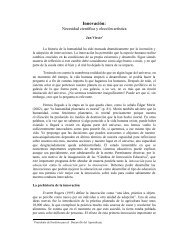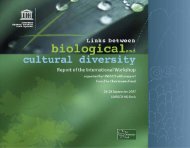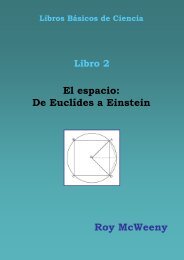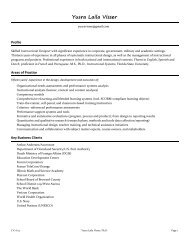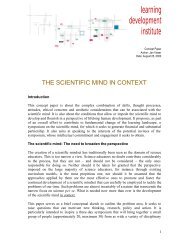The planet we live on: The beginnings of the Earth Sciences
The planet we live on: The beginnings of the Earth Sciences
The planet we live on: The beginnings of the Earth Sciences
- No tags were found...
Create successful ePaper yourself
Turn your PDF publications into a flip-book with our unique Google optimized e-Paper software.
Figure 3.27: Global temperature changeover <strong>the</strong> last 2000 years, compiled from10 different sources (shown in differentcolours), including tree ring and glacialdata.Figure 3.28: <str<strong>on</strong>g>The</str<strong>on</strong>g> amount <strong>of</strong> carb<strong>on</strong> dioxidein <strong>the</strong> <strong>Earth</strong>’s atmosphere over <strong>the</strong> past40,000 years and (inset) <strong>the</strong> last 1000 years,measured from <strong>the</strong> bubbles <strong>of</strong> air trappedin ice cores.changed greatly, by as much as 10 ◦ C bet<str<strong>on</strong>g>we</str<strong>on</strong>g>en <strong>the</strong> warmest and coldest periods. It alsoshows that in geologically recent times, over <strong>the</strong> last 10,000 years, temperature has remainedparticularly stable. This is important is it is <strong>the</strong> time in which most <strong>of</strong> humanhistory has taken place; such developments might not have been possible if <strong>the</strong> temperaturehad not been so stable.This is why <strong>the</strong>re is such c<strong>on</strong>cern over <strong>the</strong> recent global warming shown in Figure 3.27.This graph shows that recent temperatures have been 0.3 ◦ C warmer than at any time in<strong>the</strong> last 2000 years and that this temperature increase is increasing.Temperature increases in <strong>the</strong> past have been associated with a similar increases in <strong>the</strong>amount <strong>of</strong> carb<strong>on</strong> dioxide in <strong>the</strong> atmosphere, as shown in Figure 3.28. Ho<str<strong>on</strong>g>we</str<strong>on</strong>g>ver, whe<strong>the</strong>r<strong>the</strong> increase is forcing (or causing) <strong>the</strong> climate change is still being debated.Nowadays that fact that both <strong>Earth</strong>’s temperature and <strong>the</strong> carb<strong>on</strong> dioxide c<strong>on</strong>tent <strong>of</strong><strong>the</strong> atmosphere have increased over <strong>the</strong> past 200 years, and are c<strong>on</strong>tinuing to increase,is not disputed by <strong>the</strong> majority <strong>of</strong> scientists. Most scientists also think that <strong>the</strong> increasein carb<strong>on</strong> dioxide in <strong>the</strong> atmosphere is linked to <strong>the</strong> extensive burning <strong>of</strong> fossil fuels, likecoal and oil, since <strong>the</strong> industrial revoluti<strong>on</strong> began, 200 years ago.<str<strong>on</strong>g>The</str<strong>on</strong>g> carb<strong>on</strong> dioxide in <strong>the</strong> atmosphere is part <strong>of</strong> <strong>the</strong> complex carb<strong>on</strong> cycle and hugeamounts <strong>of</strong> carb<strong>on</strong>, cycle through <strong>the</strong> <strong>Earth</strong>’s systems annually. Plants absorb carb<strong>on</strong>dioxide and release oxygen during photosyn<strong>the</strong>sis whilst all respiring organisms, plantsand animals, have <strong>the</strong> opposite effect, absorbing oxygen and releasing carb<strong>on</strong> dioxide.This means that <strong>the</strong> amount <strong>of</strong> plant cover <strong>on</strong> <strong>Earth</strong> affects <strong>the</strong> amount <strong>of</strong> carb<strong>on</strong> dioxidein <strong>the</strong> atmosphere, which is why people are c<strong>on</strong>cerned about <strong>the</strong> felling <strong>of</strong> <strong>the</strong> tropical rainforests. After deforestati<strong>on</strong>, <strong>the</strong> <strong>Earth</strong>’s surface can absorb less carb<strong>on</strong> dioxide, leavingmore in <strong>the</strong> atmosphere.91



